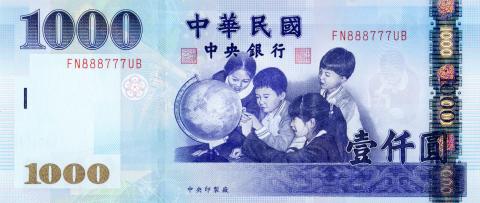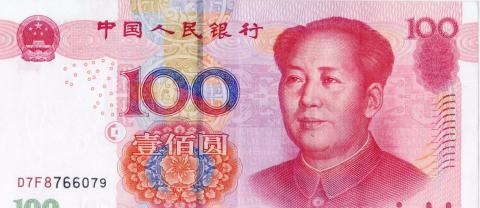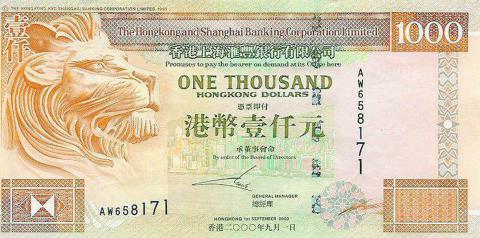A Greater Taichung man’s contention that the nation’s most common bills in circulation contain a printing error that has gone unnoticed for decades has sparked a heated debate.
Huang Pai-tsun (黃百村), a bedding merchant, said that the Chinese character for “one” (yi, 壹) on all NT$100 and NT$1,000 banknotes is incorrect.
The upper part of the character yi should be shi (士, scholar), with the top horizontal stroke longer than the bottom one, Huang said.

Photo: Lin Liang-che, Taipei Times
However, the banknotes in circulation have it wrong, he said, with the character written as tu (土, land or earth), which has a top horizontal stroke that is shorter than the bottom one.
Huang said he has double-checked with standard Chinese dictionaries and computer word processors and verified that the banknotes contain a misprint.
However, an official from the central bank’s currency issuance department denied that it was a misprint.

Photo: Lin Liang-che, Taipei Times
“There is no mistake in the Chinese character on the bills,” the official said.
Officials from the central bank’s Central Engraving and Printing Plant added that the printed characters on the currency bills were designed specifically for aesthetic purposes and to guard against counterfeiting, and, as such, differ from the regular written form.
“All printed characters on the bills were uniquely designed. If they were the same as those printed by a computer, then the bills would be easy to counterfeit,” an official said.

Photo: Lin Liang-che, Taipei Times
Yang Meng-chu (楊孟珠), a Chinese-language teacher at a senior-high school in Greater Taichung, is unconvinced, saying she thinks the central bank is wrong.
According to the Kangxi Dictionary (康熙字典), the root character for yi is shi; the central bank has therefore made a blunder by misprinting the root character as tu, Yang said.
A look at banknotes containing the character yi in China, Hong Kong and Macau show that they are printed with the root character shi.
“The Taiwanese government has always stressed that we are a country that uses the traditional Chinese system of writing. We should therefore be careful to follow the proper form,” Huang said.
“The central bank has made an error on the circulating bills. This has become an international joke. As China, Hong Kong and Macau all use the correct Han Chinese form, I want to see the central bank rectify the error at once. We should not allow this mistake to continue,” he added.
Money collector Yang Chuan-ming (楊川明) appeared to support Huang’s findings, saying he had made a careful study of all banknotes issued from the Japanese colonial era to the period right after World War II and found that all were written in the proper form.
“However, the [print] on the bills issued by the Chinese Nationalist Party (KMT) government starting from 1949 were all changed to tu,” he said.
In 1949, the KMT government had to deal with several crises, including soaring inflation and social unrest, and had to undertake a major fiscal restructuring, Yang Chuan-ming said.
“That was the time the KMT government mandated the conversion of one New Taiwan dollar for every 40,000 old Taiwan dollars. It was the start of the New Taiwan currency, with the issuance of NT$0.01, NT$0.10 and NT$100,” he said.
“From then on, the yi character on currency bills almost all had the wrong root on top. Very few bills got it right since then,” he said.

Alain Robert, known as the "French Spider-Man," praised Alex Honnold as exceptionally well-prepared after the US climber completed a free solo ascent of Taipei 101 yesterday. Robert said Honnold's ascent of the 508m-tall skyscraper in just more than one-and-a-half hours without using safety ropes or equipment was a remarkable achievement. "This is my life," he said in an interview conducted in French, adding that he liked the feeling of being "on the edge of danger." The 63-year-old Frenchman climbed Taipei 101 using ropes in December 2004, taking about four hours to reach the top. On a one-to-10 scale of difficulty, Robert said Taipei 101

Nipah virus infection is to be officially listed as a category 5 notifiable infectious disease in Taiwan in March, while clinical treatment guidelines are being formulated, the Centers for Disease Control (CDC) said yesterday. With Nipah infections being reported in other countries and considering its relatively high fatality rate, the centers on Jan. 16 announced that it would be listed as a notifiable infectious disease to bolster the nation’s systematic early warning system and increase public awareness, the CDC said. Bangladesh reported four fatal cases last year in separate districts, with three linked to raw date palm sap consumption, CDC Epidemic Intelligence

US climber Alex Honnold left Taiwan this morning a day after completing a free-solo ascent of Taipei 101, a feat that drew cheers from onlookers and gained widespread international attention. Honnold yesterday scaled the 101-story skyscraper without a rope or safety harness. The climb — the highest urban free-solo ascent ever attempted — took just more than 90 minutes and was streamed live on Netflix. It was covered by major international news outlets including CNN, the New York Times, the Guardian and the Wall Street Journal. As Honnold prepared to leave Taiwan today, he attracted a crowd when he and his wife, Sanni,

Taiwanese and US defense groups are collaborating to introduce deployable, semi-autonomous manufacturing systems for drones and components in a boost to the nation’s supply chain resilience. Taiwan’s G-Tech Optroelectronics Corp subsidiary GTOC and the US’ Aerkomm Inc on Friday announced an agreement with fellow US-based Firestorm Lab to adopt the latter’s xCell, a technology featuring 3D printers fitted in 6.1m container units. The systems enable aerial platforms and parts to be produced in high volumes from dispersed nodes capable of rapid redeployment, to minimize the risk of enemy strikes and to meet field requirements, they said. Firestorm chief technology officer Ian Muceus said